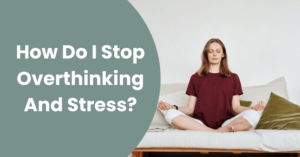Have your PMS cramps and mood swings gotten worse the last few months or years? Do you have intense pain or feel depressed before your period? It might be a sign of PMS due to hormonal changes.
If you’ve suddenly experienced changes in your menstrual cycle and PMS it may be due to hormonal imbalance, estrogen dominance, age, chronic stress, diet or other lifestyle factors. The severity of your PMS symptoms can start after ovulation 10-14 days before your period starts. While some women experience moderate cramps, irritability and mood swings – other women may feel depressed, anxious, fatigued and have brain fog. If you have severe PMS symptoms, it may be term called PMDD. In my Hormone Type Quiz, you can find your body type and diet plan to start balancing your hormones and relieve PMS symptoms. You can also get my free eBook following 6 easy steps to change your habits, lifestyle and diet.
In order to address why your PMS symptoms suddenly feel so bad, we’ll go through the cause, symptoms, menstrual cycle and natural treatment of PMS.
What Is The Main Cause Of PMS?
Have you suddenly experienced changes in your PMS symptoms – and now it suddenly feels worse than it used to? If you suddenly have mood swings feel anxious and have cramps before your period, you are most likely experiencing premenstrual syndrome.
But what causes PMS, you may wonder? Scientific research has suggested a few possible theories.
According to research, PMS is triggered as a response to hormone imbalance that occurs after ovulation in non-pregnant women.
You may experience fluctuation in levels of estrogen and progesterone during the luteal phase as your hormones drop rapidly from the peak they had reached earlier. This imbalance may lead to a variety of PMS symptoms including anxiety and mood swings.
Your general lifestyle, such as your diet, exercise patterns and stress levels may also affect the PMS symptoms.
In addition, your PMS symptoms and their intensity change gradually with age. A variety of factors such as pregnancy, stress, menopause and sensitivity to hormonal changes may influence your symptoms.
Certain women may also experience a sudden change in the intensity of their PMS symptoms – but why does women’s PMS suddenly get worse?
Can PMS Symptoms Suddenly Get Worse?
If you’ve been experiencing sudden changes and intensity in your PMS symptoms and you have more intensive cramps, mood swings or are bloated it might be due to a few changes in your hormones, lifestyle and diet.
1. Estrogen Dominance
You may be experiencing a sudden increase in mood swings and cramps due to estrogen dominance.
In simple terms, estrogen dominance refers to the condition when there’s an increase in estrogen levels in relation to progesterone levels.
This can be due to:
- Overproduction of estrogen
- Changes in estrogen metabolism
- Imbalance in estrogen and progesterone ratio
The hormone levels in your body are also affected by your weight and adipose tissue. Increased adipose tissue or too high BMI can stimulate excess estrogen production, which can lead to estrogen dominance. It’s like a cycle effect, where estrogen dominance can make it more difficult to lose weight.
2. Lifestyle And Diet
General lifestyle and diet can also impact the intensity of PMS. For instance, a study suggested that eating a diet that has high levels of saturated fat, refined sugar and salt can worsen your PMS symptoms.
Too much caffeine and excess stress can also contribute to more severe PMS symptoms.
Caffeine is great in helping you stay more alert and focused, but not only can it interfere with your sleep patterns, it may also cause an increase in irritability and anxiety.
Research shows that limited intake of caffeine can help reduce period cramps for women.
If you’re experiencing bad PMS symptoms, you may feel irritated and in a low mood after ovulation – which means 10-14 days before your period starts.
But why do your PMS symptoms last that long, you may wonder?
Is It Normal To Have PMS 2 Weeks Before Period?
Generally, your menstrual cycle is measured from the first day of your period until the next one appears.
The average menstrual cycle for women is around 28-29 days, however, the length of the cycle can vary. For example, a woman’s age can have an impact on the length of the cycle and the severity of PMS symptoms.
For teens, the average cycle can last up to 45 days. On the other hand, it may last between 21 to 38 days for women in their 20s and 30s.
There are four phases of the menstrual cycle that impact PMS:
1. Menstruation
During this phase, the uterus lining sheds and is discharged through the genitals. Estrogen and progesterone levels are generally low and this phase lasts for around 3 to 7 days on average.
2. Follicular Phase
The pituitary glands in your brain release FSH (follicle-stimulating hormone), which stimulates your ovaries to start producing follicles that store eggs.
Estrogen is produced as the follicles grow and the uterine lining thickens as a result. This phase lasts for around 10 to 14 days and begins on the first day of your period.
3. Ovulation
Ovulation is the most fertile phase of the menstrual cycle, increasing your chances of getting pregnant. During this stage, your follicle matures and releases the egg into the fallopian tube.
4. Luteal Phase
The final stage lasts for around 10 to 14 days. During the luteal phase, progesterone production increases and the uterine lining thickens, preparing for possible pregnancy.
The cycle begins all over again if the egg is not fertilized. You’re most likely to experience PMS symptoms during the luteal stage.
As the luteal phase occurs around 10 to 14 days prior to your period, it’s not uncommon to experience PMS two weeks before your period. Excess stress, hormone imbalance and your general lifestyle may cause irregularities in your cycle.
Disclaimer; If you’re concerned about the severity of symptoms, I would suggest reaching out to your doctor for advice.
You may experience a change in your PMS symptoms as you get older – but why do PMS symptoms suddenly get worse?
Why Are My PMS Symptoms Getting Worse With Age?
As you age, your body develops and undergoes a variety of changes in hormones which have an impact on your menstrual cycle as well.
Factors like pregnancy, stress, hormones and lifestyle play a big part in influencing PMS symptoms.
Generally speaking, women in their 20s and 30s have more regular cycles. PMS symptoms might be mild in nature and you might notice a stable pattern.
However, as women age, we’ll naturally produce less estrogen and the ovaries lose the ability to be fertile and create a fetus.
The actual perimenopause period begins in your mid to late 40s, and can typically last up to four years before your periods stop completely.
During this time period, hormone levels (particularly estrogen and progesterone) fluctuate unpredictably, causing irregularity in your menstrual cycle. As a result, your PMS symptoms are more intense and you may feel extra sensitive.
However, other factors that interfere with PMS symptoms are hormonal imbalances, diet and lifestyle factors – in my FREE eBook, you can follow 6 easy steps to kickstart hormonal balance and reduce PMS symptoms.
If you feel like your PMS symptoms have gotten worse over the months or years, you may wonder what the normal PMS symptoms feel like.
What Are The Symptoms Of Bad PMS?
As I’ve mentioned earlier, the PMS symptoms you experience might be different from what other women around you experience.
The severity of your symptoms is dependent on a variety of factors including your physical health, diet, lifestyle and age but also your surrounding environment.
Some of the common emotional and physical PMS symptoms you may experience prior to your period includes:
- Cramps
- Tender breast
- Muscle ache
- Headache
- Diarrhea
- Fatigue
- Acne
- Mood swings
- Irritability
- Change in appetite
- Change in sleep patterns
Most of the symptoms mentioned above are quite common for women, with the intensity varying for each woman.
However, these aren’t the only symptoms. There are also a few less common PMS symptoms you may experience.
Uncommon PMS Symptoms
Some women, particularly those that are of childbearing age, might experience severe PMS symptoms.
These symptoms feel so bad for some women that they might interfere with their daily routine and can even impact various relationships.
Some of the uncommon PMS symptoms that may occur include:
- Severe fatigue
- Anxiety
- Depression
- Forgetfulness
- Anger
- Insomnia
- Brain fog
If you experience any of these symptoms with high levels of severity, it may be due to the term called PMDD.
What Does A PMDD Episode Look Like?
PMDD refers to premenstrual dysphoric disorder which is a more severe version of PMS. It mostly affects women of childbearing age, but can also have an impact on women of other ages too.
It’s a medical condition that requires proper attention and treatment due to the impact it may have on one’s life. The research to determine the cause of PMDD is limited, but experts suggest that it may be caused by serotonin deficiency or abnormal reactions to normal hormone changes. Some women are more vulnerable to PMDD than others.
The factors that may increase the risk of PMDD include:
- Family history of severe PMS or PMDD
- Abnormal hormonal changes
- Personal- or family history of mental illness such as depression or other mood disorder
Women who suffer from PMDD may also be suffering from severe anxiety, depression and panic attacks.
If you or anyone you know shows signs of PMDD, I would suggest that you reach out to your doctor for professional assistance and treatment.
However, if you’re suffering from PMS symptoms and want relief, there are a few natural methods to follow.
How Can I Relieve PMS Naturally?
If you have bad PMS symptoms, there are a few ways that can help you reduce your PMS symptoms. These remedies will not only help you reduce overall discomfort but may also help improve your menstrual cycle.
This includes:
- Regular Exercise
Physical exercise releases endorphins, which are natural painkillers. Regular exercise can not only boost your mood but may also help reduce stress. - Stress Management
PMS symptoms can be aggravated due to excess stress. Mediation or other relaxation techniques might be useful in relieving stress. - Anti-Inflammatory Diet
Reducing sugar and caffeine levels in your diet can help make PMS symptoms more bearable.
Most women have a specific hormone type, which can help determine their body type and the storage of adipose tissue.
It would be more effective to incorporate a diet plan that’s appropriate for your hormone type. If you don’t know your hormone type, you can take my FREE Hormone Type Quiz to find your specific diet plan.
In addition, you can incorporate supplements and natural remedies into your daily routine to reduce PMS symptoms.
These include:
- Chasteberry
Also known as Vitex, chaste berry is a herbal supplement that can alleviate mood changes, irritability and can also help with tender breasts.
- Calcium
Calcium helps regulate hormone levels during your menstrual period and may be beneficial for muscle cramps. Regulating your calcium intake can help reduce cramps, mood swings and bloating.
- Magnesium
Magnesium helps reduce inflammation and has a calming effect on your nervous system. Research shows that it can help improve PMS symptoms. - Vitamin B6
Vitamin B6 not only boosts serotonin but also increases levels of the neurotransmitter GABA in your brain. Low concentration of GABA may be linked to anxiety and mood disorders. - Ginkgo Biloba
Ginkgo Biloba is a herbal supplement that helps increase blood and oxygen flow, which improves overall cognitive function and alleviates your mood.
It may be beneficial for tackling anxiety and sudden mood changes. - St. John’s Wort
St. John’s Wort may help increase serotonin levels. As a result, it may relieve anxiety, depression and other sudden mood changes.
If you’re having a hard time figuring out the dosage and the type of supplements to take, please seek guidance from your healthcare provider or book a consultation here.
Final Thoughts
Our hormones change as we age, but also due to lifestyle factors, stress and diet. Changes in hormones can lead to hormonal imbalances, weight gain, PMS symptoms, etc.
I personally recommend checking your hormones through a DUTCH test, if you have any concerns about hormonal imbalance.
The DUTCH test is one of the most precise hormone tests on the market and I can send you the test directly to your address, analyze the result and help you make a plan to balance your hormones.
In addition, you can also join my 12-week Bringing You Balance program to kickstart balancing your hormones.






